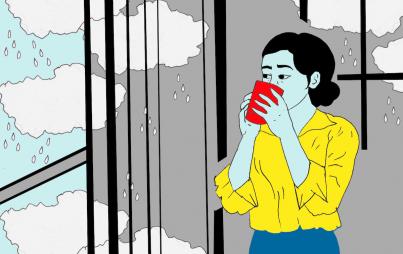
It looks like hacker collective Anonymous is at it again. This group of internet activists has won many a heart over their right-the-wrongs! intiative throughout the public sphere. From pestering the loathsome Westboro Baptists, to exposing a cover-up in the notorious Steubenville rape case, it's hard not to root a bit from the grandstands. But as easy as it is to laud such actions against injustice, Anonymous’ suspected latest action more fully makes clear why vigilante justice can be problematic.
You may have heard about the Justina Pelletier child-custody case—it's been splashed big across the headlines. Here's the lowdown:
Last year the Pelletier family brought their daughter into Boston Children’s Hospital to treat complications of a rare mitochondrial disorder. While there, physicians questioned the diagnosis of the disease her family claims has plagued their daughter her entire life. The doctors determined it was in fact a psychological issue and proceeded to remove Justina from her parent’s custody and place her in the psychiatric ward.
Taking matters into their own hands, Anonymous posted a Youtube video lambasting the hospital, the medical director that made the decision to take Justina into custody, and the judge who upheld the decision. Since last weekend, a group strongly bearing the hallmarks of Anonymous has been launching attacks against Boston Children’s Hospital’s website.
Sounds like a fist-pump worthy act of retribution, right? An institution with the hubris to take away a child from her loving parents and accuse the family of making up her debilitating health problems? This is a nightmare scenario for any parent, and the hospital is cruising for a bruising. Except, like most things in life, the story is more complicated than that.
Mitochondrial disease refers to a broad set of ailments caused by defects in cell energy production. Symptoms vary widely between patients and overlap with problems associated with a vast array of other diseases and psychological disorders. Justina Pelletier exhibited some of the symptoms that can be associated with mitochondrial disease (sometimes slurred speech, difficulty walking, digestive problems), but several tests doctor’s at Children’s Hospital performed on her came up negative for the disease.
This doesn’t mean the diagnosis was definitely wrong—since not all mitochondrial disorders manifest in tests—but when coupled with the fact that a diagnosis of mitochondrial disease is sometimes used as a cover for medical child abuse, doctors grew concerned.
Never heard of “medical child abuse”? Turns out this is yet another way to harm children. So here goes!
In hypochondria by proxy, parents have a psychological hang-up that their child is sick—regardless of his or her actual health—and they may go from doctor to doctor until they get a profound diagnosis. This can lead to unnecessary and dangerous medical intervention for the child—in fact research suggests that one in 10 children who suffer medical abuse ultimately die at the hands of their parents. (Yikes.)
Moreover, one study found that more than half of children subjected to medical abuse had been tested for mitochondrial disease—a condition that provides the heavy involvement with the medical system that the parents psychologically seek.
Sure enough, some of Justina’s symptoms bore the hallmarks of medical child abuse. She had gone through extreme surgical procedures for digestive problems—the most common symptom for this type of abuse—and her parents had engaged in extensive physician-shopping. Not to mention doctors felt Justina’s emotional state improve when her parents left the room.
Hospital administrators ultimately filed charges against the Pelletiers, accusing them of subjecting her to injurious and unneeded medical treatments, and attributing her symptoms to psychological stress. Given their diagnosis of medical abuse, the administrators felt they couldn’t send Justina home with her parents, so they made the difficult decision to make her a ward of the hospital for the time being. (She's been moved from the psych ward to a residential health care facility.)
Meanwhile, the full extent of infrastructure damage from the hackers is unclear, but an internal memo obtained by the Boston Globe said the hospital “received a direct, credible threat against our internal network, including staff and patient information.” That doesn’t sound good, does it?
While many groups like Anonymous have a severe knee-jerk reaction to the notion of parental rights infringement, the sad reality is that there’s a lot of really shitty parents in the world. There are physically and sexually abusive parents, wantonly negligent parents, and mentally ill ones not sufficiently capable of caring for their children. There are parents who completely shut their children off from the outside world. There are anti-vaxers who leave their children (and others) vulnerable to atrocious diseases, and parents who straight-up deny their children medical care. And, as may be the case here, there are ones who essentially torture their children with too much medical action. It’s unfortunate, but in many of these cases, institutional intervention is simply the only reasonable action.
It’s often difficult to parse out guilt and innocence when it comes to complicated, emotionally-charged cases like this. And flawed as it is, the best way of doing the painstaking work of deconstructing such cases is through the justice system, not through vigilantism—which history can attest often does a poor job of meting out fair outcomes.
As the situation currently stands, we the public simply don’t know whether Justina Pelletier’s case is one of legitimate parental activism, or disturbing child abuse. And neither does Anonymous.
Image: commons.wikimedia.org.






